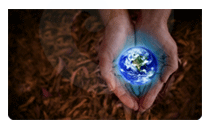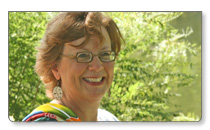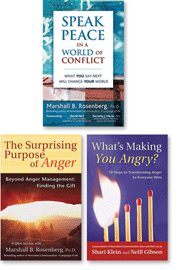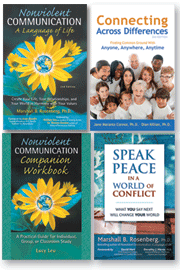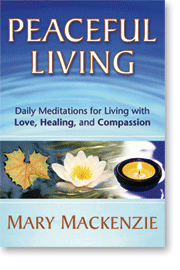Practicing Peace ... continued
The peaceful Pacific is replaced by the cacophony of cars that buzz outside my window, and my peace of mind evaporates. The dog needs walking, breakfast needs cooking, and the children need to get to school and parents to work. The phone rings and the world intrudes.
I wonder what happened. It was all so simple and easy on the cushion. This is not a recent phenomenon; rather, it's a dilemma that has dogged me for over 25 years whenever I have re-entered the world from meditation and attempted to continue being present with an open heart, moment-to-moment awareness.
It was my son who helped me bridge the gap between practice and life. As a teenager, he wrecked more than one car, experimented with all of the temptations that a California beach city offers, dropped out of school, quit his job, and bummed around the state—living in trees, churches and abandoned barns. In the midst of those events, I was an emotional wreck. I kept telling myself if only he would wake up, grow up and wise up, then I wouldn't suffer anymore. We tried therapy for several of his teen years, but eventually he would refuse to go after it became abundantly clear the therapists were biased toward my husband and me.
In the midst of my despair, I was asked to attend an in-service training along with the other staff and faculty at the Santa Cruz Waldorf School. The training was called Nonviolent Communication.
The weekend before the class, I stayed up half the night reading Dr. Marshall Rosenberg's book Nonviolent Communication: A Language of Life. While most of the book resonated with by Buddhist training and beliefs, I wondered if I could apply those four simple communication steps: Observation, Feelings, Needs and Requests. It seemed so canned and mechanistic. Wouldn't others see through the fact that I was following a speaking formula?
The trainer, Jean Morrison, was skilled and adept at using the language and made it seem so simple. But my judging mind was getting in the way. Jean used stuffed animal puppets. I told myself "she doesn't realize we use only natural toys in Waldorf Schools." I also kept thinking, "using mechanistic language would block true heart-to-heart communication." Yet desperate for any tool to help me better connect with my son, I persevered.
At first, I would practice NVC in the sauna at the gym, where people are surprisingly open about their lives. It took a lot of presence to remember the NVC components: a combination of both cerebral work (remembering the steps of the process), and heart work (as the process itself moves your from your intellectual mind to your heart). But I was getting results. People were responding, and I learned that what Marshall Rosenberg says is true: sometimes when someone speaks, it's just the tip of the iceberg.
If we show empathy, they begin to reveal more of the iceberg. Before we know it, we're learning that this person never felt they were good enough in their parent's eyes and have spent their entire adult life trying to prove they are worthy. Witnessing this process, I learned something very important: I don't have to fix anything, give advice, console, agree, or even sympathize.
The mere act of being present, getting in touch with feelings and needs, has tremendous possibility for spiritual growth and transformation. Thich Nhat Hanh calls this deep listening. Recently, I had the opportunity to go even deeper with this work at several week-long NVC retreats.
Many of the attendees had spiritual practices and a lot of silence was used during the training. In our morning empathy circles, I was privileged to once again witness transformation as individuals would share what appeared to be a conflict in their lives. Once we got down to the basic human needs (understanding, peace, cooperation, appreciation, love), we discovered the apparent discord was really just different strategies to fulfill the same need.
When this understanding resonated with the speaker, something shifted, and there was an ah-ha cathartic moment. As I witnessed others touching their suffering, my pain diminished as well. I came to the realization that empathy has the power to heal both the speaker and the witnesses.
Empathy is the practice of peace. Nonviolent Communication is the wise or mindful speech I have been missing in my life. The deeper I experience and enjoy using the NVC process, the more it complements my sitting practice and the more I am able to be empty, be present, and connect empathically with my family and friends. One of the strongest connections I see between the two practices of meditation and the NVC process is the idea of pure observation.
If I can observe without moralistic judgment and evaluation, then I can see clearly into the nature of things.
When I use my judging mind, I am no longer objective and there is a disconnect. And when I am in touch with feelings and needs, there is connection. Emotions are impermanent, constantly changing, and thus freedom of choice arises at every moment. I have a choice to look for the need behind an emotion, or simply observe it, as it arises and subsides.
Meditation has given me the mental clarity to see that other people's anger and frustration has nothing to do with me. Through studying and practicing the NVC process, I have learned that their anger is an expression of unfulfilled needs. Through the practice of empathy, I can serve others in helping them to discover the cause of their suffering. I can join them in a dance of discovery and not be intimidated or upset by their anger. And I've learned there is really only one war that I have control over, the war that goes on inside of me every day.
When I use self-empathy and stay aware of my feelings and needs, I am more at ease with myself and able to share that peace with others. Mahatmas Gandhi once said, "be the change you want to see in the world." This is what NVC offers.
My son is now 20 years old and living in La Paz, Mexico. When he realized I had no more demands or expectations for him to attend college or get a job, he took the first bus to San Diego and followed his heart to warmer climates. His Spanish is almost perfect now and he sends us hand-painted post cards. His voice on the telephone is joyful and contented.
He's talking about coming home for the holidays and re-enrolling in the community college for the spring semester. Whatever he decides, it will be his decision to choose his path without guilt, demands, or expectations from me. I am deeply grateful to him for being the catalyst that helped me touch my own suffering and healing—and discover how to actively practice peace moment-to-moment.
Christine King, credentialed teacher and certified trainer with the Center for Nonviolent Communication, is passionate about meditation and NVC. She is pursuing the application of the NVC process to issues of addiction and mental illness. Christine has taught NVC in schools, jail, universities, adult school, and privately. She lives in Santa Cruz, California (USA). Visit her at www.CommunicateForLife.com/
Keep learning these vital communication skills with these books and training resources:
This Month's Specials:
- NVC Anger Management Book Package or eBook Package - Save 50% off list price through May 31, 2012
- NVC Starter Kit Book Package or eBook Package - Save 65% off list price through May 31, 2012
Every Day Book Package Specials:
- NVC Marshall B. Rosenberg, Ph.D. Book Package and eBook Package - Save 45%-55% on this book package every day from PuddleDancer Press
- NVC Reference Library Package and eBook Package - Save 50%-60% on this book package every day from PuddleDancer Press

